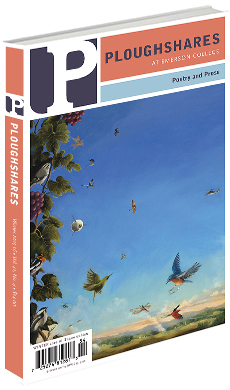An Ordinary Misfortune (Emerging Writer’s Contest Winner: POETRY)
In poetry, our winner is Emily Jungmin Yoon for two poems entitled “An Ordinary Misfortune.”
Matthew Lippman, the poetry judge, writes about the winning poems: “They continue to resonate long after my reading of them. I love the lyrical quality to the verse. I love how she speaks so powerfully about identity (historical and present) and sexuality, gender. They are layered and full.”
Yoon is a poet and translator. Her work has appeared or is forthcoming in Rattle, The Offing, Catch & Release, Best of the Net 2014, and elsewhere. She is the winner of AWP’s WC&C Scholarship Competition 2015. She received her MFA at New York University, where she served as a Starworks Fellow and as the Washington Square Review’s Award Editor. She is currently the Poetry Editor for The Margins, the literary magazine of the Asian American Writers’ Workshop. She began her PhD in East Asian Languages & Civilizations at the University of Chicago in fall 2015.
About her winning pieces, Yoon writes, “I’m currently most interested in exploring the various types of violence against the woman’s body in Korea, from the colonial era (1910-1945) to contemporary times; I’m thinking about the kisaeng (traditional female entertainers), ‘comfort women’ or sex slaves of the Japanese Imperial army, women during the Korean War, and women today. I am also thinking about my own exoticized and foreignized body existing in the US, a country built on imperialism and genocide, and the threats—some of which are exercised in ‘good humour’ or with ‘no intent to harm/hurt’ by some—that every girl/woman everywhere lives under. The two poems that won the contest are part of a series of prose poems all titled ‘An Ordinary Misfortune’ that deal with those topics. I had not written a lot of prose poems before I began working on this series, but I fell in love with the form. I like the boxes of text holding poetic language. I like the urgency, the lack of breathing space. I like how the sentences are chained together, giving equal weight to each idea or image. I also have many doubts when writing these poems; I have to examine my own possibly colonizing manners when narrating a story that is not mine, and make sure that I don’t have false information.”
She offered him head because he wanted her whole. You could at least blow me, he offered. She didn’t want to offend. He was taking his pants off. Are we on? he said. She was in love. She said I’m in. When she couldn’t finish, he seemed put off. She should’ve put out. Because Look what you did, he said. Look what you did. That wasn’t even worth it. He felt blue. She felt bad. She sucked. She blew it. She remembered googling putting out and finding: Chris lost interest in Ashley because she wasn’t putting out. Joe dumped his girlfriend because she won’t “put out” for him. If a gal doesn’t “put out” by the third date, I dump her. Something was off. Guys are like that though, guys need it more, she had been offered. It’s her fault if she turns him on, doesn’t get him off. If he wanted her whole. If he left. Whore. Girls always use sex to get what they want, someone had cracked. The teacher was showing versions of Judith with the Head of Holofernes. Klimt. Caravaggio. Gentileschi. Allori. She remembered Allori. Judith looking out at her. Holding the head by the hair. As if to offer. To allure.



